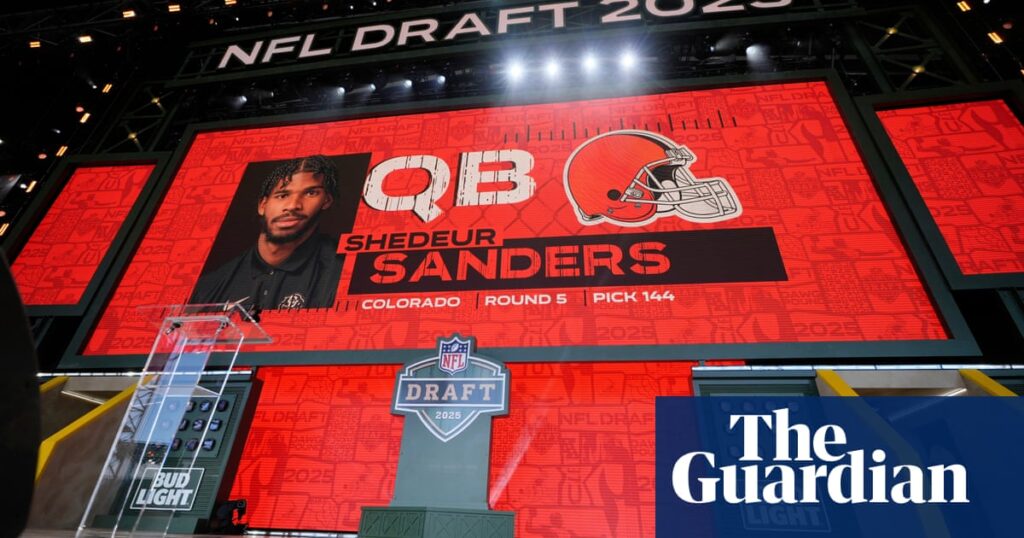The NFL Draft is a momentous occasion for aspiring athletes, marking the culmination of their hard work, dedication, and often, an emotional rollercoaster. However, this year’s draft took an unexpected turn for Shedeur Sanders, stemming from a prank call that drew significant media attention. This incident, involving the son of an NFL coach, not only amplified discussions about Sanders’ character but also raised questions about privacy and the responsibilities of those involved in the NFL. In this analysis, we will explore the implications of the prank on Sanders’ future and the NFL’s scrutiny on behavior and reputation.
What Happened During the NFL Draft?
During the second day of the NFL Draft, Sanders, the former Colorado quarterback, found himself on the receiving end of a prank call. The caller, later identified as Jax Ulbrich, son of Atlanta Falcons defensive coordinator Jeff Ulbrich, impersonated New Orleans Saints GM Mickey Loomis. The prank unfolded while Sanders awaited his selection, leading to widespread reactions on social media. According to reports, the prank and subsequent leak of Sanders’ private number are under investigation by the NFL.
In an Instagram post, Jax Ulbrich expressed his remorse, labeling his actions as “completely inexcusable, embarrassing, and shameful.” He acknowledged that he took away from what should have been a celebratory moment for Sanders. While Sanders suggested that it didn’t let the prank impact him negatively, he acknowledged its childishness.
The Atlanta Falcons organization has since stated that they are reviewing their protocols to prevent similar incidents. They have communicated with the Sanders family, offering sincere apologies, and have affirmed that Jeff Ulbrich was unaware of the prank until after it occurred.
Broader Implications for Player Behavior and Reputation
This prank alongside feedback regarding Sanders’ conduct during the draft process exposes larger themes surrounding player behavior and reputation management in the NFL. Despite his talent, Sanders faced criticism leading up to the draft and was seen by some as a player who might have let off-field distractions affect his performance on the field.
Reports from the combine indicated that some interviews were less than successful, often leading analysts to label these interactions as the worst formal interviews seen in years. Insiders suggested that Sanders struggled to engage effectively, which could have contributed to his draft position. While talent remains crucial, a player’s interactions and overall persona before the draft can heavily influence their journey into the league.
The draft reflected a tumultuous climate where Sanders, despite being a standout collegiate player, faced misjudgment regarding his professionalism. The weight of expectations is evident, which complicates narratives around players like Sanders by intertwining personal character with performance indicators.
Response from the NFL and Future Career Ahead for Sanders
As the NFL investigates the prank and how Sanders’ private information was disclosed, the incident may prompt discussions about privacy and communication protocols within teams. Teams are expected to adapt and ensure the confidentiality of their players, emphasizing the importance of professionalism in operations. In this digital age, safeguarding personal information is as crucial as maintaining athlete integrity.
Looking ahead, Sanders’ professional journey will be crucial in the spotlight. With the Cleveland Browns selecting him in the fifth round, his performance will ultimately determine how he progresses in the league. Sanders enters a competitive quarterback room, facing challenges from both rookie and seasoned players.
The prank call involving Shedeur Sanders during the NFL draft is not merely an anecdote but a significant commentary on player management, privacy, and personal development. As the dust settles, both Sanders and the NFL must engage in reflective processes, ensuring that mistakes are mitigated moving forward.
Primitive as it may be, the incident serves as a stark reminder that in the professional arena, personal integrity and reputation are paramount. A carefully navigated response can forge a better path ahead for Sanders as he seeks to carve out a successful career in the NFL.

